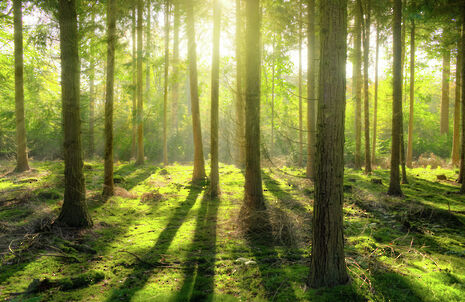Expressible: Beauty
In her third column, Sneha Sen opts for a more uplifting voyage into the untranslatable, charting the beauty of trees on sunny days, cosmic existential beauty, and more

The onset of freshers’ flu seems to have characterised the last week for me and too many of the people I’ve spoken to (regardless, sadly, of whether they were freshers or not). I thought it would be welcome relief to revisit happier, prettier times in this week’s column, with a tribute to how the world’s languages express beauty.
I hope that many of you manage to visit beaches over summer and when you’re on holiday at other times – because there’s just something irresistible about feeling sand beneath your feet and watching waves weave across the rocks. I happen to live in Cornwall, so beach trips become something of a habit during summer for me. The Kwangali language, spoken in Namibia by only 85,000 people in total, expresses the appeal of beaches perfectly with its word hanyaku. Hanyaku describes the act of walking on your tiptoes across warm sand – something which I hope everyone has experienced, or will get to experience, at some point during their lives.
“It refers to the sound that leaves make when the wind rustles through the trees, or simply to the rustling noise of leaves when you brush against them”
Languages other than English also seem to find ways to express some of the more beautiful things that nature offers us. The Japanese word 木漏れ日, which would be transcribed in English as komorebi, is made up of the grammatical particle れ and three distinct characters with meanings. 木 means ‘tree(s)’, 漏 means ‘escape’, and 日 means ‘light’ or ‘sun’. The term together refers to the sunlight that filters, or escapes, through the leaves of the trees – next time you’re standing under a tree on a sunny day, look up – and you’ll see what that really means.
Apparently, we humans seem to like describing all things tree- and leaf-related, because English/Greek and Russian also have words for specific tree- and leaf-related phenomena. The rare English word psithurism is an adaptation of the Greek ψιθύρισµα or ψιθυρισμός, meaning ‘whisper’. It refers to the sound that leaves make when the wind rustles through the trees, or simply to the rustling noise of leaves when you brush against them. Russian, on the other hand, happens to contain the word листопад, transcribed in English as ‘listopad’, which means the falling of the leaves, and presumably refers to the glorious change of seasons that takes place around this time every year, as summer turns to autumn and autumn turns to winter.
Japanese seems to be the language that best expresses ideas about beauty, because the next two words about beauty in more philosophical sense also come from there. 侘寂, transcribed as wabi sabi, is the intuitive way of living that emphasises finding beauty in imperfections, and accepting that everything is transient in the natural cycle of growth and decay. Perhaps it’s not something any of us are capable of understanding to its full extent yet, as young, healthy people with our whole lives ahead of us, but we can certainly grasp the concept. It’s the acceptance that no matter how hard you try, you’re never going to live up to this idea of perfection that you have in your head, or live what you deem ‘the perfect life’. It’s the realisation that life is more enjoyable when you learn to take pleasure in the little things instead – those evenings spent talking and laughing with only your closest friends, the power that a simple mug of hot tea or coffee has to brighten your day, the feeling of triumph when a supervisor seems to only be able to find positive things to say about your essay.
The Japanese 幽玄, transcribed in English as yugen, describes a deep, mysterious sense of the universe and its beauty, which triggers an emotional response that is too powerful to put into words. It’s how you feel when you realise that the Earth has been around for four and a half billion years, that it will continue to exist long after our small, insignificant lives have reached their conclusion, and that it is simply one small sphere rotating around one average-sized star, out of the two billion (at least) which exist in the Milky Way galaxy alone. The latest estimates assume that there are at least one hundred billion in the observable universe as we know it – if those facts combined don’t provoke 幽玄, I don’t know what else could.
Finally, it’s time to circle back to Europe for a classic Romance language: Spanish. Its word duende refers to the strange power of a work of art to affect you deeply. Perhaps it’s when you stumble across a painting and realise that it seems to perfectly represent the current state of affairs in your life. Perhaps it’s when you hear a song that reminds you of your favourite childhood memory. Perhaps it’s a book or film that causes you to question your entire world view when it ends.
What, you might ask, has this week’s particular smattering of words that express beauty taught us? Not much, on the surface. But when wabi sabi forces you to look below it, to find the beauty in the imperfections, you see that there are so many different kinds of beauty – whether natural, or philosophical, or about the universe, or art. And of course, there’s something about feeling warm sand under your toes that can’t quite be put into words – or at least, not English ones
 Comment / Plastic pubs: the problem with Cambridge alehouses 5 January 2026
Comment / Plastic pubs: the problem with Cambridge alehouses 5 January 2026 News / Cambridge businesses concerned infrastructure delays will hurt growth5 January 2026
News / Cambridge businesses concerned infrastructure delays will hurt growth5 January 2026 News / New movement ‘Cambridge is Chopped’ launched to fight against hate crime7 January 2026
News / New movement ‘Cambridge is Chopped’ launched to fight against hate crime7 January 2026 News / Uni-linked firms rank among Cambridgeshire’s largest7 January 2026
News / Uni-linked firms rank among Cambridgeshire’s largest7 January 2026 News / AstraZeneca sues for £32 million over faulty construction at Cambridge Campus31 December 2025
News / AstraZeneca sues for £32 million over faulty construction at Cambridge Campus31 December 2025









